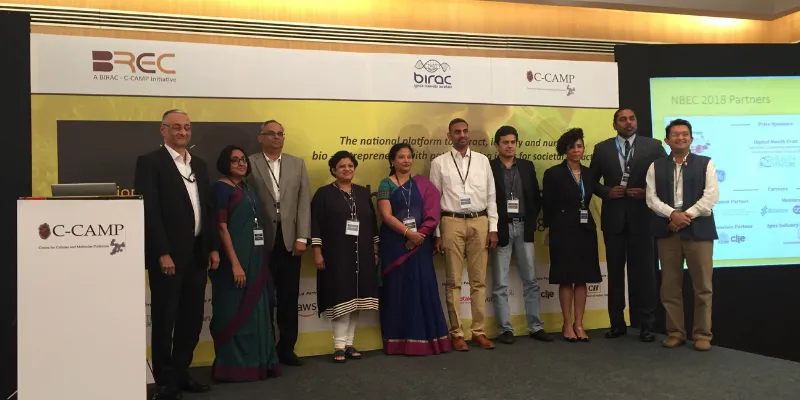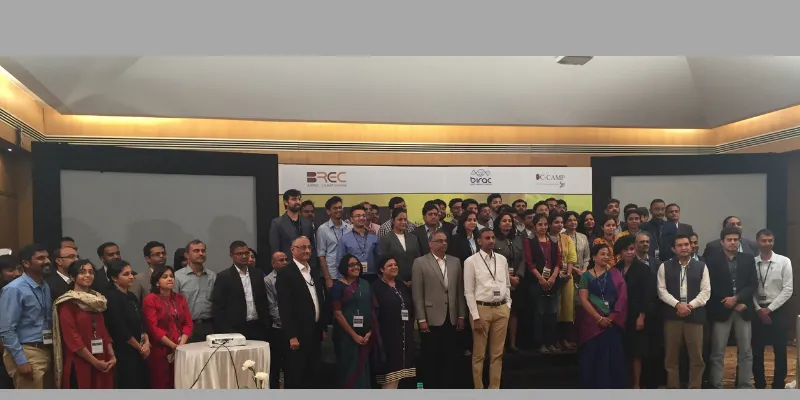10 bio-entrepreneurs win prizes worth Rs 2.25 Cr from C-CAMP and BIRAC
Bio-entrepreneurs took centre stage with innovative business ideas at the recent National Bio-entrepreneurship Competition in Bengaluru.
The National Bio-entrepreneurship Competition organised in Bengaluru recently celebrated startups that merge science and business. In its second edition, the competition looked at ideas that propose significant societal impact in the life sciences domain.
In all 45 finalists were screened from 2,000+ registrations and 15 finalists participated in a pitching session judged by experts from the biotech industry and investment sector.
Organised by the Centre for Cellular and Molecular Platforms under the BIRAC (Biotechnology Industry Research Assistance Council) Regional Entrepreneurship Centre (BREC), a joint initiative of C-CAMP (Centre for Cellular and Molecular Platform) and BIRAC, the nation-wide competition saw Rs 2.25 crore worth cash prizes and investment opportunities.

Gaurav Gupta, Principal Secretary, Department of IT, BT and S&T, Government of Karnataka, said,
“Karnataka continues to attract a lot of attention from life sciences startups. It’s important that academia, industry, and the government work together closely to keep the ecosystem energised. CCAMP is like the nucleus of deep science research-based bio ideas.”
We list down the 10 bio-entrepreneurs and their startups who won accolades.
1. KBCols Sciences: reviving the use of natural colours
To eliminate the damage caused by synthetic colours, this startup is working on creating natural colours by using microbes. KBCols Sciences Pvt Ltd won L’Oreal India’s grand cash prize of Rs 15 lakh.
Microbes are among the cheapest, most abundant, and unexplored biological feedstock available in large quantities and can be exploited to extract colours. “These natural colours can find applications in food, pharmaceuticals, textiles, and cosmetics. The endeavour explores microbes as an inexhaustible source that can be used for extracting different natural colours,” says Vaishali Kulkarni, the Founder of KBCols Sciences.
2. HelpUsGreen: from floral waste to bio leathers
Retrieving floral waste from temples, mosques, and other religious spaces, HelpUsGreen has developed the world’s first “flowercycling” technology to produce animal-free, cost-effective, and engineerable bio-leather out of floral waste. The initiative also addresses air and water pollution caused by traditional leather industries. “HelpUsGreen bio-leathers are a genesis of a new circular economy model with triple bottom benefits of environmental, societal, and financial sustainability,” says Nachiket Kuntla, the research scientist who won the L’Oreal India grand cash prize of Rs 15 lakh.
3. Nayana: your next eye doctor is a smartphone app
The first smartphone-based solution for automated assessment of glaucoma from fundus images, Nayana is a point-of-care diagnostic solution. It is compatible with imaging devices to address retinal pathologies such as glaucoma, macular degeneration, diabetic retinopathy, exudate analysis, retinal oximetry, and vascularisation analysis.
Its user-friendly interface sends periodical updates and offers value-add. Nayana is an on-device solution (for small data scenarios) and back-end server/cloud solutions for big data scenarios. It can be integrated in iOS, Android, Desktop, says Chandra Sekhar Seelamantula, the Founder.
The startup has won the Rs 10 lakh digital health prize sponsored by HealthVenture, US.
4. SphinX: bowel management through a replaceable port
SphinX is a healthcare product developed by Crimson Healthcare Pvt Ltd for patients suffering from colorectal cancers, inflammatory bowel diseases, and other intestinal pathologies. The startup walked away with a Rs 5 lakh excellence prize sponsored by Biocon.
Pranav Chopra, Managing Director, said,
SphinX is an ostomy (bowel) management device that is a soft and pliable insertable port; it acts as safe, secure, and discreet solution. A SphinX port is replaced every 28 days, and does not need supporting accessories such as adhesives, belts etc. It also eliminates bag-associated skin excoriations.
The device was developed under Stanford India Biodesign (SIB) in collaboration with the Department of Biotechnology (DBT), All India Institute of Medical Sciences (AIIMS), Indian Institute of Technology-Delhi (IIT-D) and Stanford University US in partnership with Indo-US Science and Technology Forum (IUSSTF).
5. Module Innovations: credit card-sized UTI detector
Developing an easy diagnostic tool for Urinary Tract Infections, Module Innovations walked away with a Rs 5 lakh excellence prize sponsored by Biocon. UTI, the second highest infection in humans, affects 150 million people globally. The diagnosis is either clinically performed or by using resource and labour intensive methods such as culture or microscopy.
USenseTM is a credit card-sized test that can detect four major uropathogens in 30 minutes. Founder Sachin Dubey said,
The module has several other products in its pipeline with the focus on making diagnostics rapid and available at point of care. Our vision is to improve how healthcare is delivered.

6. Innaumation Medical Devices: voice restoration for throat cancer patients
Healthcare startup Innaumation Medical Devices is working in the field of voice restoration for throat cancer patients. Their device, Aum voice prosthesis, is a low-cost speaking device for cancer patients who have lost their voice due to surgical removal of the voice box. Current devices cost between Rs 25,000 and Rs 45,000. But AUM, made using platinum-cured, medical-grade silicon, is priced at only Rs 50 (<$1).
Asif Ahmed, Marketing manager who won an excellence prize of Rs 5 lakh sponsored by GE Healthcare, said, “Speech and communication is not only a basic tenet to sustain life force, but also a right for freedom, peace, justice, and dignity. Cost constraints kept these patients bereft of this essential means of communication.”
7. Inochi Care: working to accelerate wound healing
Inochi Care has a vision to provide quality wound care products for complete healing of medically complex wounds like diabetic foot ulcers and pressure ulcers (bed sores). The primary aim of this startup is to create cost-efficient, patient-centred wound care products to avoid complications of non-healing wounds. The longterm vision is to make wound treatment easier, faster, accessible, and affordable.
Led by Dr Shivani Gupta and Neelarnab Dutta, the startup walked away with the Rs 3.5 lakh Pfizer Entrepreneurship Award in healthcare. The founders said their approach is to use more than one proven therapeutic means of wound healing.
8. Nemocare: baby wear with monitoring devices
Nemocare is building innovative, affordable, accessible, and highly accurate monitoring solutions to prevent neonatal deaths. Their wireless wearable sensors and networks function on analytical algorithms and big data as tools to provide continuous, high-resolution monitoring and preventive care for patients.
Their product, which won a $100,000 investment opportunity from HealthVenture, is called Nemocare Raksha. The IoT-enabled smart wearable (for the baby's foot) monitors vital parameters like spo2, heart rate, respiration rate, body temperature, and body position.
Founder Manoj Sankar said,
This information is relayed over to the hub and the data is pushed on to the cloud. This data can be accessed at a central monitor; the nurse or doctor can continuously and remotely monitor all babies through a single interface.
9. Bioprime: bio-activators to replace chemical fertilisers
Bioprime develops alternative bio-organic and sustainable solutions for crop improvement, nutrition, and protection. With agricultural biologicals acting as bio-activators, the startup ensures sustainable crops despite the growing impact of climate change and crop losses. The bio-activators - an alternative to conventional chemical pesticides - also allow growers to maintain beneficial insect (natural predator) populations in their fields.
Its SNIPR technology (Smart Nanomolecules induced Physiological Response)-based products are certified organic and residue-free. SNIPR-based products have been commercially launched in 10 states in India.
“For farmers who are battling crop loss in changing climatic conditions, SNIPR offers certified residue-free, organic next-gen biological products simulating the defense/adaptation system evolved and perfected by nature itself,” says Founder Renuka Diwan.
The company has been awarded the Biotechnology Ignition Grant (BIG) & Seed fund from BIRAC, DBT, for developing new solutions in agriculture biotechnology.
10. VRehab: effective and affordable rehabilitation solutions
Working in the sector of rehabilitation, VRehab is creating proof-based, effective, and affordable therapeutic solutions for addressing challenging health problems. The startup uses the latest technologies like Virtual Reality, Haptics etc in its medical devices.
Founder Bose Karthik walked away with a Boot Camp participation opportunity from HealthVenture, a healthcare investment firm.
“Last year, the state government saw the third round of the biotechnology policy, which supports incubation spaces, funding, and research among other things. Almost 250 startups have been assisted in terms of seed funding through events like Elevate and Bangalore Tech Summit,” he said.
Addressing the gathering, Dr Renu Swarup, Secretary, DBT, Government of India, and MD, BIRAC, said:
The significance of a competition such as NBEC is in creating a vibrant pool of innovators. It helps connect various institutes in the country, bringing a pan-India flavour to the ecosystem. But the area where we have really succeeded is in projecting India’s investment-ready startup market globally. I am very pleased that BIRAC and CCAMP are working together in this important initiative. I hope many other incubators become partners in this exercise.







